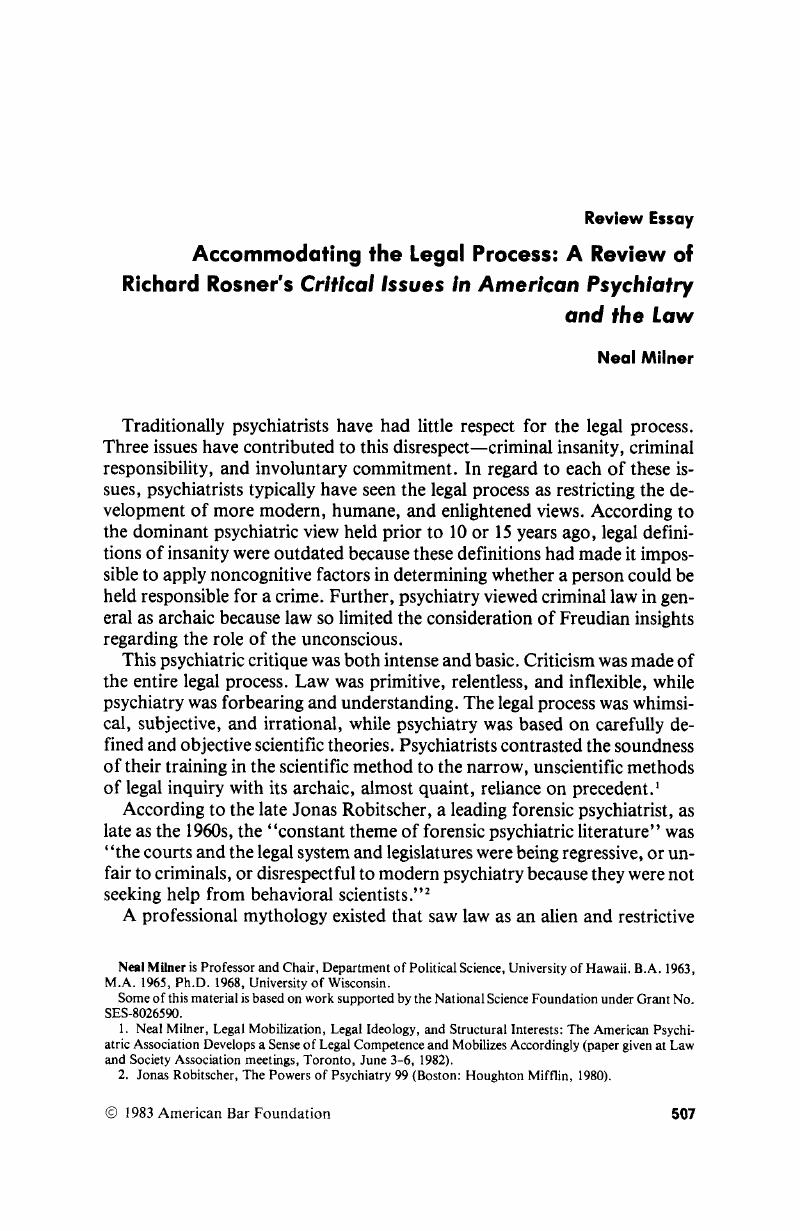No CrossRef data available.
Article contents
Accommodating the Legal Process: A Review of Richard Rosner's Critical Issues in American Psychiatry and the Law
Published online by Cambridge University Press: 20 November 2018
Abstract

- Type
- Review Essay
- Information
- Copyright
- Copyright © American Bar Foundation, 1983
References
1 Neal Milner, Legal Mobilization, Legal Ideology, and Structural Interests: The American Psychiatric Association Develops a Sense of Legal Competence and Mobilizes Accordingly (paper given at Law and Society Association meetings, Toronto, June 3–6, 1982).Google Scholar
2 Jonas Robitscher, The Powers of Psychiatry 99 (Boston: Houghton Mifflin, 1980).Google Scholar
3 Id. at 46.Google Scholar
4 Frank T. Lindman & Donald M. McIntyre, Jr., eds., The Mentally Disabled and the Law 14 (Chicago: University of Chicago Press, 1961).Google Scholar
5 Durham v. United States, 214 F.2d 862 (D.C. Cir. 1954).Google Scholar
6 Milner, supra note I; Stone, Alan A., The Myth of Advocacy, 30 Hosp. & Community Psychiatry 819(1979).Google Scholar
7 Richard Rosner, ed., Critical Issues in American Psychiatry and the Law (Springfield, Ill.: Charles C. Thomas, 1982).Google Scholar
8 Philippe Nonet & Philip Selznick, Law and Society in Transition: Toward Responsive Law (New York: Harper & Row, 1978).Google Scholar
9 Robert L. Sadoff, Expertise in Psychiatry and Civil Law, in Rosner at 120.Google Scholar
10 Richard Schuster & Peter D. Guggenheim, Focus of Clinical Practice in a Family Court Mental Health Service, in Rosner at 196.Google Scholar
11 Robert Lloyd Goldstein, New Dimensions of Expertise in Psychiatry and Criminal Law: The Determination of Three Unusual Forms of Competency, in Rosner at 133.Google Scholar
12 Emanuel Tanay, Psychiatric Contributions to Child Custody Determination, in Rosner at 216.Google Scholar
13 Robitscher, supra note 2, at 480–81, is even more complimentary toward law: “The medical model is authoritarian. Law, in some of its aspects is just the contrary, emphasizing protection from authority. Because law and psychiatry are so different, training is very different. Legal education tries to promote analytic ability and constant questioning whereas medical education emphasizes the respectful acceptance of what the lecturer presents as scientific fact. Lawyers are not insulted when they are challenged to give the basis of their opinions, but psychiatrists appear incensed when their conclusions are questioned or rejected.” See also infra text accompanying note 25.Google Scholar
14 Michael L. Perlin, Psychiatric Hospitalization: Some Predictions for the Eighties, in Røsner at 239.Google Scholar
15 Henry H. Foster, The Impact of Child Advocacy on Family Structures, in Rosner at 57.Google Scholar
16 Samuel Gorovitz, Could Oliver Wendell Holmes, Jr., and Sigmund Freud Work Together If Socrates Were Watching?in Rosner at 341.Google Scholar
17 Richard Rosner, A Conceptual Model for Forensic Psychiatry: A Guide for the Perplexed, in Rosner at 5.Google Scholar
18 Id., The Roots of the Controversy Between Psychiatry and the Law: An Essay in Speculative Ideological Archeology, in Rosner at 231.Google Scholar
19 Milner, Neal, Models of Rationality and Mental Health Rights, 4 Int'l J.L. Psychiatry 35 (1981).Google Scholar
20 Ralph Slovenko, Psychological Testing as a Basis for Expert Testimony: Use or Abuse, in Rosner at 92.Google Scholar
21 Stephen Rachlin, Abraham L. Halpern, & Stanley L. Portnow, A Formula for Sane Procedures Following Acquittal by Reason of Insanity, in Rosner at 321.Google Scholar
22 Willard Gaylin, The Killing of Bonnie Garland: A Question of Justice 258–59 (New York: Simon & Schuster, 1982).Google Scholar
23 Michael G. Kalogerakis, The Historical Roots and Development of Psychiatric Involvement in Domestic Relations, in Rosner at 171.Google Scholar
24 Jonas Robitscher, ECT and Invasive Therapies, in Rosner at 303.Google Scholar
25 Robitscher, supra note 2.Google Scholar
26 Gaylin, supra note 22.Google Scholar
27 E.g., Willard Gaylin et al., Doing Good: The Limits of Benevolence (New York: Pantheon Books, 1978); Willard Gaylin, Caring (New York: Alfred A. Knopf, 976).Google Scholar
28 Gaylin, supra note 22, at 202.Google Scholar
29 Id. at 11.Google Scholar
30 Id.Google Scholar
31 id.Google Scholar


